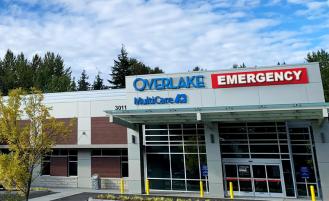Overlake Medical Center Awarded an “A” for Patient Safety by Hospital Safety Score
Overlake Medical Center was honored with an “A” Hospital Safety Score by The Leapfrog Group, an independent national nonprofit run by employers and other large purchasers of health benefits. The A score was awarded in the latest update to the Hospital Safety ScoreSM, the A, B, C, D or F scores assigned to U.S. hospitals based on preventable medical errors, injuries accidents, and infections. The Hospital Safety Score was compiled under the guidance of the nation’s leading experts on patient safety and is designed to give the public information they can use to protect themselves and their families.
“Overlake’s commitment to patient safety is every employees’ responsibility and a focus for us every day with every person who comes to our facility. This recognition is a one more testament that everyone can expect the finest care here at Overlake,” said President and CEO Craig Hendrickson.
“Hospitals like this that earn an A have demonstrated their commitment to their patients and their community,” said Leah Binder, president and CEO of The Leapfrog Group. “I congratulate Overlake Medical Center for its safety excellence, and look forward to the day when all hospitals will match this standard.”
To see Overlake Medical Center’s scores as they compare nationally and locally, visit the Hospital Safety Score website at hospitalsafetyscore.org, which also provides information on how the public can protect themselves and loved ones during a hospital stay. People can also check their local hospital’s score on the free mobile app, available at hospitalsafetyscore.org.
Calculated under the guidance of The Leapfrog Group’s nine-member Blue Ribbon Expert Panel, the Hospital Safety Score uses 26 measures of publicly available hospital safety data to produce a single score representing a hospital’s overall capacity to keep patients safe from infections, injuries, and medical and medication errors. The panel includes: John Birkmeyer (University of Michigan), Ashish Jha (Harvard University), Lucian Leape (Harvard University), Arnold Millstein (Stanford University), Peter Pronovost (Johns Hopkins University), Patrick Romano (University of California, Davis), Sara Singer (Harvard University), Tim Vogus (Vanderbilt University), and Robert Wachter (University of California, San Francisco).








